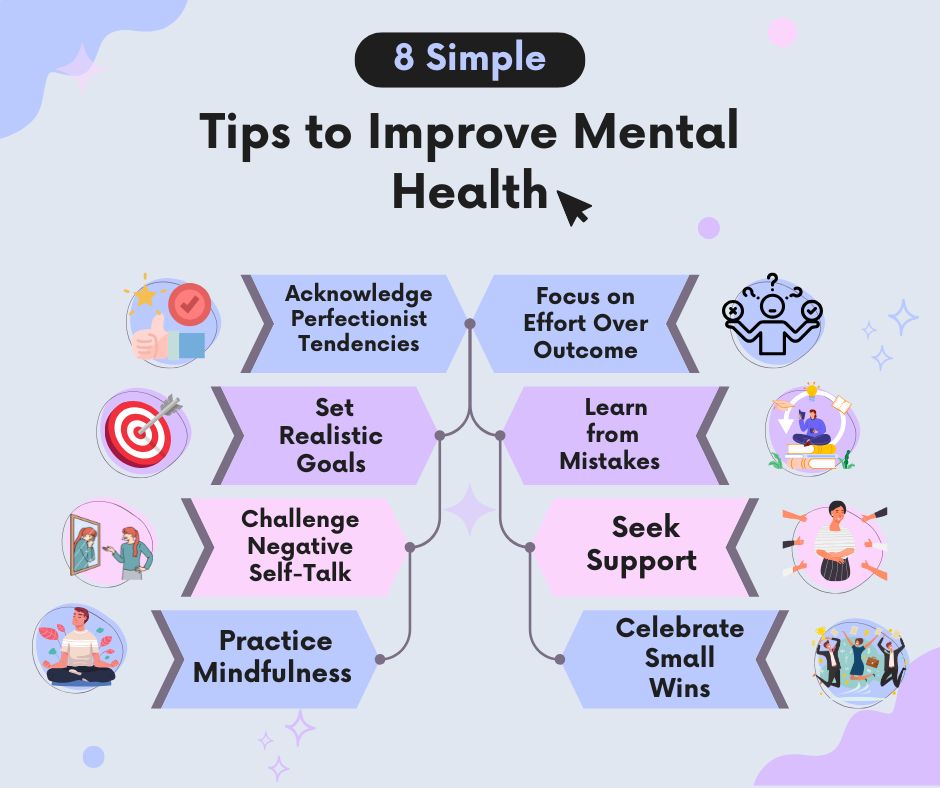Tackling Perfectionism: How High Expectations Affect Mental Health?
What Is Perfectionism?
A personality trait known as perfectionism can be described by placing excessive and unwarranted pressure on oneself. A ongoing urge to reach perfection is typical in people with perfectionistic dispositions, and they typically feel dissatisfied when their high standards are not met. While striving for excellence can be empowering, perfectionism may trigger problems with mental health and anxiety, particularly when ambitions are unrealistic or unreachable.
A Brief History of Perfectionism
In early psychology, the concept of perfectionism was believed to be an attribute that should be connected with highly successful achievers. Nevertheless by the middle part of the 20th century, scientists had started to discover some of its potential disadvantages particularly how it contributed to mental health disorders. The value of finding a balance among ambition and self-care has been emphasized in contemporary psychological studies since excessive perfectionist tendencies can be damaging to both mental and physical well-being.
How Perfectionism Affects Your Mental Health
Perfectionism influences mental health in different ways, sometimes fabricating a harsh pattern of anxiety, low self esteem , and stress. Some of the ways that perfectionism can negatively influences mental health are:
1. Stuck in Overthinking
Overthinking is common among perfectionists. The constant analysis of past actions and decisions can lead to anxiety and prevent individuals from moving forward.
2. The Hazard of Comparing Yourself to Others
Perfectionists often compare themselves to others, which can lower self-esteem and increase feelings of inadequacy. This social comparison feeds anxiety and depression.
3. Scared of Messing Up
Fear of failure or mistakes often prevents perfectionists from taking risks. This fear, while rooted in a desire for success, creates an ongoing sense of self-doubt and stops growth.
4. Strain in Relationships
Assumptions can harm both personal and professional relationships. They often project one’s expectations onto others, leading to misunderstandings and resentment.
5. Putting Things Off Because of Perfectionism
Perfectionism can lead to hesitation. People stay away from missions due to anxiety of imperfection, which contributes to stress and occasional mental health challenges as deadlines approach
6. Feeling Physically Bad
The fear of not being perfect can be definite in physical signs like tension headaches, sleep interference, and weakness, all of which originate from mental stress.
7. Ignoring Your Emotional Needs
Individuals may pay too much attention to accomplishing something and they can disregard their inner peace and well-being. This self neglect can result in anxiety and burnout.
8. Stuck in a Stable Way of Thinking
Perfectionists often struggle with rigid thinking, making it hard for them to adapt or see the bigger picture. This can limit their ability to think creatively and keep a steady, healthy mindset.
Therapy: A Pathway to Manage Perfectionism
Understanding and addressing perfectionism through therapy can be transformative. A trauma-informed approach helps individuals identify underlying reasons for perfectionism, such as childhood experiences or past traumas. Mindfulness procedures are extraordinarily beneficial in managing perfectionist inclinations, permitting individuals to manage anxiety and exercise self-empathy.
Overcoming Perfectionism: 8 Practical Tips to Improve Mental Health

Conclusion
It is essential to understand the root of perfectionism and make some changes in thinking in order to attempt to address it. People can shift their perspective on perfection by focusing on growing as individuals and self-compassion as opposed to striving for unattainable objectives with practice and encouragement. They can manage the impacts on their mental health and live more fulfilling lives with the help of therapy and achievable initiatives.
FAQs
1. What is the root cause of perfectionism?
This is often influenced by genetics, social environments, and psychological factors. It can develop from life experiences, excessive parental involvement, societal pressure, or a strong need for control.
2. Can perfectionism cause anxiety and depression?
Yes, it is associated with anxiety, depression, and other mental health challenges.
3. Is it possible to overcome perfectionism?
Yes, it is possible to manage and overcome this condition. Even if it is deeply embedded, it can be addressed by self-awareness, therapies, and the implementation of better ways to cope. People can learn to let go of unattainable goals and embrace a more balanced perspective on life with time and effort.
4. What type of therapy is best for tackling perfectionism?
CBT and mindfulness-found remedies are helpful for directing perfectionism. These procedures assist individuals in defying negative thinking designs and growing healthier routines.
5. Can perfectionism have physical effects on the body?
Yes, it could lead to physical signs like headaches, lethargy, muscle rigidity, and sleep inconvenience due to the stress and anxiety it originates.



